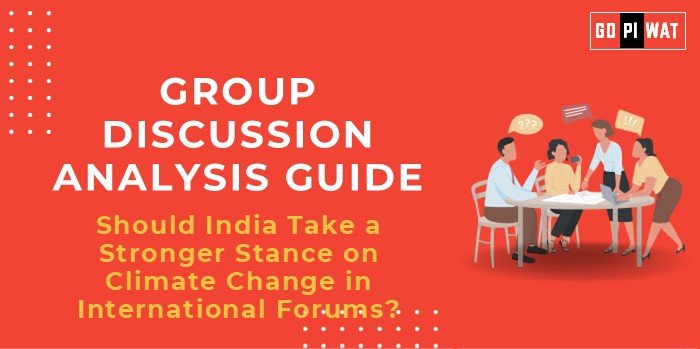📋 Group Discussion (GD) Analysis Guide: Should India Take a Stronger Stance on Climate Change in International Forums?
🌐 Introduction to the Topic
- Opening Context: Climate change stands as a critical global challenge, with nations worldwide grappling with its multifaceted impacts. As the world’s third-largest emitter of greenhouse gases, India’s position and actions are pivotal in international climate negotiations.
- Topic Background: India has been an active participant in global climate discussions, notably committing to the Paris Agreement and setting ambitious renewable energy targets. However, the escalating urgency of climate issues prompts a reevaluation of whether India should adopt a more assertive role in international climate forums.
📊 Quick Facts and Key Statistics
🌍 Global Emissions Ranking: India is the third-largest emitter of CO₂ globally, following China and the United States.
☀️ Renewable Energy Capacity: As of September 2024, India has achieved an installed solar capacity of 90.76 GW, actively working towards its 2030 target of 500 GW from non-fossil fuel sources.
⚠️ Climate Vulnerability: India ranks high on the Climate Vulnerability Index, indicating significant susceptibility to climate-induced hazards.
📜 Paris Agreement Commitments: India aims to reduce the emissions intensity of its GDP by 45% by 2030, relative to 2005 levels.
🌱 Net-Zero Target: India has pledged to achieve net-zero carbon emissions by 2070.
🏛️ Stakeholders and Their Roles
- Government of India: Formulates and implements climate policies, represents the nation in international negotiations, and spearheads renewable energy initiatives.
- Private Sector and Industry Leaders: Invest in sustainable practices, innovate in green technologies, and reduce industrial carbon footprints.
- Non-Governmental Organizations (NGOs): Advocate for environmental conservation, monitor policy implementation, and engage in grassroots climate action.
- Citizens and Youth Activists: Raise awareness, participate in climate movements, and demand stronger environmental policies.
- International Bodies (e.g., UNFCCC, IPCC): Facilitate global climate dialogues, set frameworks for action, and provide scientific assessments.
🏆 Achievements and Challenges
🎉 Achievements
- ☀️ Renewable Energy Expansion: India has become a global leader in solar energy, with projects like the Bhadla Solar Park, the world’s largest solar park.
- 🌍 International Solar Alliance (ISA): Initiated by India, the ISA promotes solar energy adoption globally, with over 110 member countries.
- 🌿 Afforestation Efforts: Programs like the Green India Mission aim to increase forest cover and enhance biodiversity.
⚠️ Challenges
- 🔥 Dependence on Coal: Despite renewable advancements, coal remains a primary energy source, complicating emission reduction efforts.
- 💸 Financial Constraints: Achieving climate goals requires substantial investment; estimates suggest up to $385 billion is needed to meet the 2030 renewable energy target.
- ⚖️ Balancing Development and Environment: Addressing poverty and economic growth while implementing stringent climate policies presents a complex challenge.
🌍 Global Comparisons
- China: While leading in renewable energy capacity, China also faces criticism for high coal consumption.
- European Union: The EU has set ambitious climate targets and has been proactive in international climate diplomacy.
📚 Case Studies
- Gujarat’s Renewable Initiatives: The state has made significant strides in solar and wind energy, contributing substantially to India’s renewable capacity.
- Kerala’s Climate Resilience Programs: Implementing effective disaster management and adaptation strategies to combat climate impacts.
🗣️ Structured Arguments for Discussion
- Supporting Stance: “By adopting a stronger stance in international climate forums, India can lead global efforts, attract green investments, and enhance its geopolitical influence.”
- Opposing Stance: “Prioritizing a more assertive international climate position may strain India’s economic growth and development objectives, given its current reliance on fossil fuels.”
- Balanced Perspective: “India should seek a balanced approach, strengthening its international climate commitments while ensuring that domestic development and poverty alleviation efforts are not compromised.”
💡 Effective Discussion Approaches
- Opening Approaches:
- 📊 Data-Driven Start: “With climate-induced disasters causing significant economic losses annually, should India not take a more proactive role in global climate negotiations?”
- 📜 Historical Context: “Since the Paris Agreement, India’s climate policies have evolved, but is the current trajectory sufficient to meet global expectations?”
- Counter-Argument Handling:
- 💰 Economic Concerns: Acknowledge the economic implications but highlight the long-term benefits of sustainable development and the potential for green job creation.
- 🌍 Developmental Priorities: Emphasize that climate action and development are not mutually exclusive; sustainable practices can drive inclusive growth.
🔍 Strategic Analysis of Strengths and Weaknesses (SWOT)
🟢 Strengths
- Abundant renewable energy resources.
- Proven leadership in international solar initiatives.
- Growing domestic market for green technologies.
🔴 Weaknesses
- High dependence on coal for energy.
- Limited access to climate finance.
- Infrastructure challenges in renewable energy deployment.
🔵 Opportunities
- Potential to become a global leader in renewable energy.
- Attraction of international investments in green sectors.
- Development of sustainable urban infrastructure.
⚠️ Threats
- Increasing frequency of climate-related disasters.
- International pressure to reduce emissions rapidly.
- Potential trade implications related to carbon tariffs.
🎓 Connecting with B-School Applications
📘 Real-World Applications
- 🌿 Green Finance Projects: Students can engage in case studies focusing on green bonds, renewable energy investments, and climate risk assessment for business strategy.
- 🔗 Sustainability and Operations: Linking operational efficiency with eco-friendly practices and supply chain sustainability.
- 💼 Corporate Social Responsibility (CSR): Examining corporate efforts to reduce carbon footprints, adapt to regulatory demands, and innovate in sustainable products.
🗨️ Sample Interview Questions
- “In what ways can India balance its economic growth targets with international climate commitments?”
- “How can Indian businesses benefit from international climate change agreements and green energy initiatives?”
- “Evaluate the effectiveness of India’s current renewable energy strategy and areas for improvement.”
💡 Insights for B-School Students
- Understanding Global Dynamics: Learn how international climate negotiations influence national economic and industrial policies.
- Strategic Business Implications: Explore opportunities for businesses to lead in sustainable practices and capitalize on new green markets.
- Policy Impacts: Analyze how changes in climate policy impact domestic and international trade, investments, and sectoral growth.


